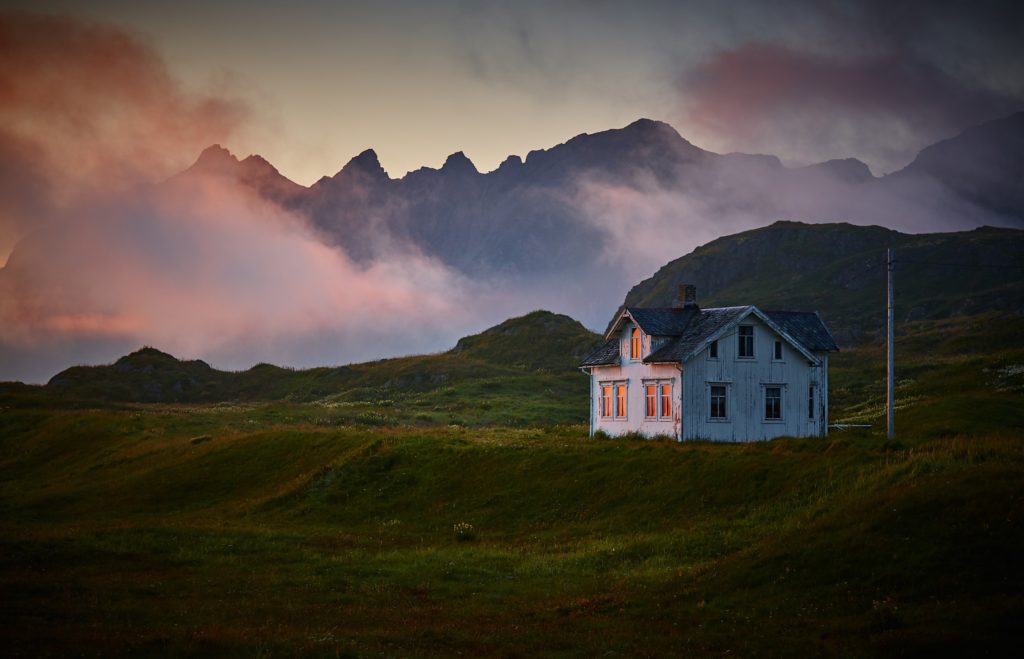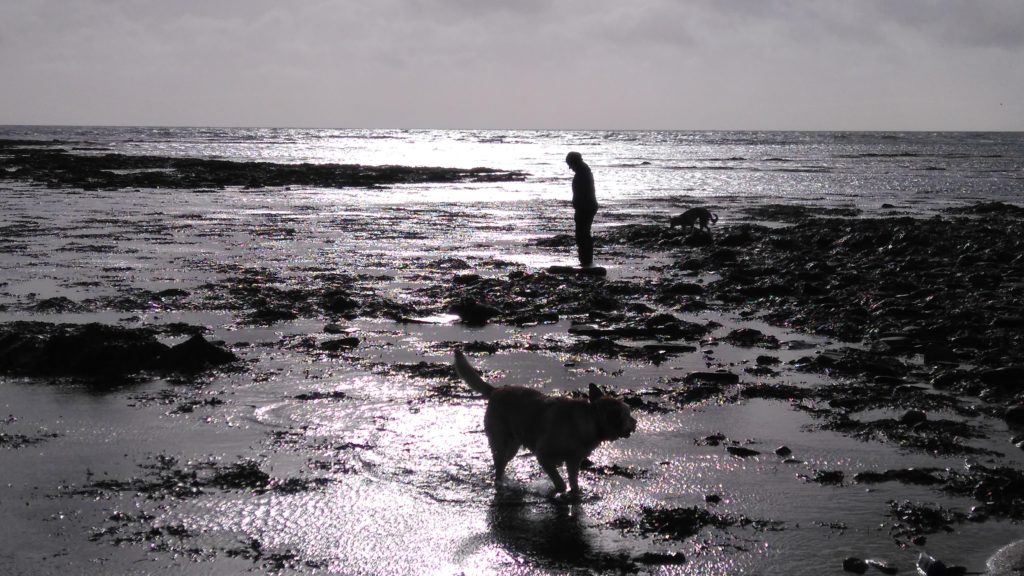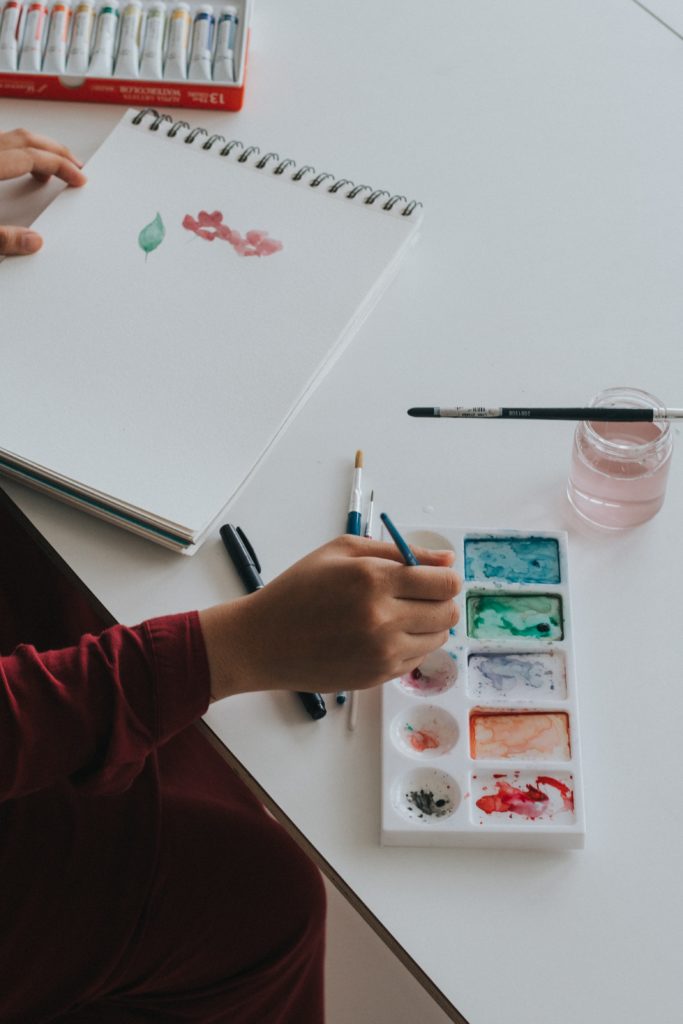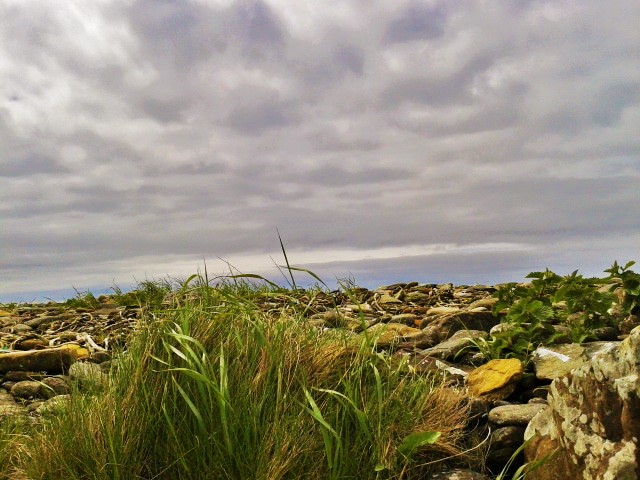Dumplings, I don’t need to tell you that we’re under some difficult and unusual circumstances right now. Personally, I find myself moving from feeling peaceful, centered, and connected, to having anxiety attacks and reacting emotionally to really small stuff, and all in the space of a few minutes. It’s a challenging time for probably almost everyone, in whatever way that manifests.
This got me thinking about the well-being and safety of myself and those around me. There are people who live in very remote areas, whose nearest neighbors can be many miles away, so they have to cope with physical distancing pretty much nonstop. So what’s their secret? How do they cope with severely limited face-to-face human contact, in places where if the one shop doesn’t have what they need, they need to get on a boat to get to the nearest actual town? How can they feel any sense of connection and community (which are commonly accepted as being crucial to humans’ well-being, no matter how much we like our own company), and manage not to go stir-crazy? Also, why is it that they stay living where they are, especially when they’re not born and bred country-dwellers, but have moved out there from bustling cities?

The Orkney Islands
My mind first went to the Orkney Islands when thinking of remote locations, mainly because it’s a place I know. Orkney is made up of approximately 70 islands, 50 of which are uninhabited. It’s located 10 miles north of mainland Scotland, and has a population of about 22,000, with the lowest populated area housing less than 100 residents. It has also been rated as “the best place to live in the UK” in 2019’s Halifax Quality of Life survey.
I’ve been to Orkney a handful of times, and have been lucky enough to get to know some people up there. My friends on the Orkney Storytelling Trust’s Committee co-opted me as Membership Secretary. I was chiefly responsible for coordinating the Storytelling Festival—mostly from my home, 2 days’ drive (521 miles) and a ferry ride away. Crazy? Perhaps—but it was the kind of crazy that gets things done, which is perhaps why they wanted me on their team! And quite a few things about my Orcadian friends struck me as really useful approaches for severe, unusual situations such as the one we’re currently in, and just generally good approaches to take in life, full stop.

Sanday (one of the main Orkney Islands)
Hobbies and Activities
For one thing, everyone I met on Orkney seems to have a range of hobbies/small businesses! The list includes painting to professional-level knitting, to competitive baking and jam-making, to learning an instrument, beer-making, jewelry-making and ceramics. Lots of people get involved in running and working in cultural and heritage centers, and everyone seems to have a real passion and love for Orkney. This industrious, diversification of skills probably comes from necessity—in a location where the population is so low, and resources are so limited, in order for everyone to survive and thrive, people needed to have several strings to their bow (quite literally in some cases). One friend said that on the islands, learning a musical instrument or telling stories was a crucial “social skill” and not merely a hobby.
As Orcadians were originally mainly fisher/farmsteaders (not relying solely on either land or sea for their food source), their way of life was built around being adaptable and therefore resilient. Now, while this approach doesn’t sit with my ethics (I would be a seaweed gatherer and arable farmer, myself!), the point still stands that they used diversification and flexibility to survive. This is a strong model, and one which can still be seen today in the myriad of activities and skills that so many people there get involved in. And this tradition is one which is being embraced by the ever-growing number of “incomers” to the islands.
According to the UK’s National Health Service, learning new skills is an important part of looking after our mental health, as it helps:
- boost self-confidence and raising self-esteem;
- build a sense of purpose;
- connect with others (granted, at the moment the safe way for that connection to take place would be via the internet or phone, but I reckon that quality and having a common purpose wins out over quantity or location).
So by finding interesting and rewarding ways to keep busy, challenged and keep their minds active, people in this remote area are regularly taking positive steps to maintain their own good mental health. This is something that experts, local Mental Health charities and Local Authorities in the UK, are promoting more and more—particularly when it’s self-led by empowered individuals!
In addition, research by UCL Institute of Education shows that Classroom learning can positively influence the well-being of adults with moderate to severe mental health problems. Not only that, challenging yourself by learning new skills or improving existing ones (especially complex skills which require the use of working and long-term memory) has been shown to slow cognitive aging in adults aged 60-90.

It’s never too late to learn a new skill
For those of us who are housebound right now, this is the perfect opportunity to do that online course (many of which are being offered for free or heavily discounted right now), pick up that musical instrument which has been gathering dust in the corner, or finally finish that business plan! As well as bringing joy and broadening our horizons (and potentially our incomes as well!), it’s a great way to stave off anxiety and give our well-being and internal resolve a boost—and we might just knock a few years off our cognitive age, too!
Creative Socializing
Another aspect is the fact that remote communities have embraced the internet (where it’s available) with gusto! Remote islanders have set up online groups and pages, to socialize and interact with each other on a daily basis when they can’t be together in person. And this means taking advantage of the capabilities of the internet—meaning that their social circles can grow to include people from different countries and cultures into these thriving and close-knit online communities! I once joined in a “Strictly Come Dancing Final” party with a group of Orcadian friends on Facebook, from the little flat in Warrington where I was living on my own at the time. I can tell you that it was as chatty, jokey and spirit-lifting social gathering as if it had been at a pub or one of our homes!
It was also because of this can-do approach, sense of sociable inclusivity, and making good use of technology for social and cultural ends, that I was able to join the Storytelling Trust from my home 500-odd miles away in England. Meetings were held by Skype, and there were a lot of unwieldy email chains at times. But the internet and the shared spirit of inclusion and determination to make it work, made it possible (despite dodgy WiFi connections)!

Co-operation and Survival
Because of the natural challenges of living on a set of remote islands, the culture on Orkney has developed around looking after yourself. A wonderful fiercely independent spirit pervades Orkney, as well as looking out for your neighbors—not only for ethical reasons, but for survival. Small remote communities tend to be more fragile, as individuals are relied on for multiple skills/resources in the long term. If John runs the only brewery, grows the island’s potatoes and mills the island’s flour, there’s no scope for fallings-out or going elsewhere for your beer, bread or potatoes without moving away to another island. For centuries and longer, people on Orkney have realized the importance of copperation and being on good terms in order to survive and thrive in a very beautiful but tough environment.
This idea is also reflected in the themes of their folklore—the character who shows kindness to a mysterious stranger, even when her family is starving, receives a gift of bounty (a gold coin in each of the peat turfs for the fire), and their mean-spirited neighbor who wouldn’t share and steals a turf, receives a rat who eats her grain. Generosity, kindness, and forgiveness are all shown in these stories as noble qualities—and these are the bedrock of a strong, resilient isolated community.
That’s something that I’ve been seeing more and more of, since the current crisis started: generosity, communities coming together, people offering to help neighbors and strangers, using the internet and leaflets as a way of reaching people who are most in need and vulnerable. This is such a positive side-effect of the current challenge. I keep reading about people carrying out small acts of kindness, and it is heartening to see people empathizing and being proactive in offering their help to those in need. Kindness and compassion are alive and well, and they’re spreading, around our communities and the world. Wouldn’t you love to see that continuing after the P-word is over? I know I would!

Connection and engagement with Environment/nature
Remote places can be rugged and challenging to live in. But they are often the most enchantingly beautiful places, where nature is largely untouched by development—and I think this is a large part of why move and stay there. Orcadians have a strong connection to their surroundings and a deep-rooted love and respect for nature. Away from industrialization, it’s easy to understand our smallness in the great vastness of nature, particularly when the Aurora Borealis, or “Merrie Dancers” puts on a show. I find this sense of awe we experience in an epic, stunningly beautiful place, can be profoundly balancing and centering.
For those of us who don’t live in rural areas, research has shown that we can reap many psychological and health benefits from houseplants, including:
- An improved mood
- Reduced stress levels
- Increased speed of reaction in a computer task
- Reduced blood pressure
- Reduced fatigue and headaches by 20-25 percent in one study; and even
- Increased pain tolerance.
According to this NBC article, “As well as enhancing your mood and creating a living space that is soothing to be in, plants can also help with loneliness and depression.” And apparently we don’t need to be seeing an actual plant: even seeing a picture of a natural scene can have proven health and well-being benefits. In one study, half the patients who were undergoing gallbladder surgery had a view of trees on their wall, and the other half had no picture. The patients with a view of trees reputedly tolerated pain better, appeared to nurses to have fewer negative effects, and were discharged sooner.
There have also been several studies measuring brain activity with an fMRI, which show that exposure to pictures of nature triggers the parts of the brain associated with love and empathy, but pictures of urban scenes triggers areas of the brain associated with fear and anxiety. According to this article, “It appears as though nature inspires feelings that connect us to each other and our environment.”
So for those of us who are not self-isolating, if we live close to a park, and it’s safe to do so with social distancing measures, taking a walk, a run or jogging in that environment could be hugely beneficial to us on a number of levels! And if we have time, according to the Yale School of Forestry & Environmental Studies, spending 120 minutes immersed in nature gives us the right “dose of nature” for us to feel healthy and have a strong sense of well-being!
My take-home lessons
In a nutshell, my take-home lessons for the current situation and beyond are:
- Keep learning, keep doing! One thing I really feel strongly about right now is that I’ve no excuse to put off learning or getting involved in the activities that I love. We only get one chance at this life, so I’m consciously filling it with things that make my soul happy, are rewarding and contribute positively to my community, as well as my well-being.
- Connecting creatively with others. Making use of the internet for things I’d traditionally do face-to-face has been a real eye-opener for me! Things like meditation groups, which I used to think needed the face-to-face aspect, have surprised me by how powerfully connected I’ve felt, and that level of positive shared experience, when everyone participates remotely, at the same time, with a little messaging before and afterwards. If the intention is there, the experience will be rewarding. And conversely, it’s made me realize how draining and unhelpful some multi-tasking/half-hearted interactions can be, when we or the other person/people are not fully present or engaged, it’s probably worth thinking about changing things up.
- Valuing and caring for each other, and ourselves. Being self-reliant and empowered doesn’t mean being in control of everything – it does mean making the best of the situation and that’s tremendously empowering to ourselves and others. Helping each other out, and considering others’ needs is really important right now – and so is showing that compassion to ourselves. I’ve really come face to face with some deep-seated stuff during the last few weeks, and have been mindfully sitting with myself, to work through it some more. Personal development and self-care are our primary responsibility. If I don’t care for myself properly, I won’t be in a position to help others who need my support.
- Connection with my surroundings, and with nature. I’m taking time to mindfully sit and appreciate my houseplants, stopping to listen to the birdsong floating in through my window and curating some favorite photos of nature from my many camera photo albums, to enjoy on screensavers/wallpaper, and to draw inspiration for my (newly rediscovered) enjoyment of painting watercolors! I’m also enjoying the sunshine in my lounge, and at night, looking at the sky to try and spot some constellations.
Keep well and stay safe, dear Dumplings. I hope that you find many moments of peace, joy, fulfillment and connection during these times. Let’s take good care of ourselves and each other—and maybe we can bring some of the silver linings with us, when we get to the other side.
Also by Ema: Is Hair Color Prejudice Affecting Your Career & Dating Life?
Vegan Chickpea Vanilla Pancakes
Get more like this—Sign up for our daily inspirational newsletter for exclusive content!
__
Photo: Unsplash; Ema Melanaphy




